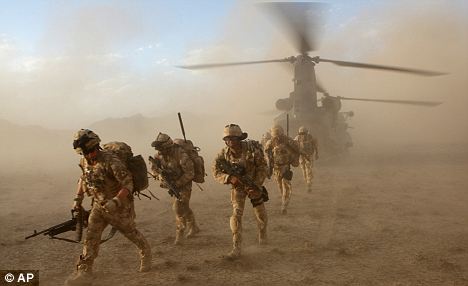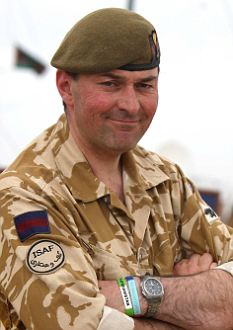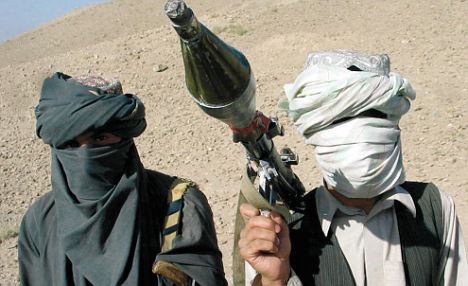
Put
to shame by a dead hero: Why we've
got it so wrong about the Taliban.
 |
|
Put
to shame by a dead hero: Why we've
got it so wrong about the Taliban. |
|
| By Adam Holloway MP on 31st October 2009 | |
The campaign in Afghanistan does not have to continue sliding ever deeper into blood. Our troops have performed magnificently in a savagely hostile environment, but the rhetoric from ministers about the Coalition's imminent success amounts to nothing more than wishful thinking. |
|
| The sad truth is that, for all the heroism of our men in the front line, the country is now less governable than it was in 2006 when the Nato force first arrived. And terrorist attacks on the UK are now more likely, not less. | |
| The simplistic answer to this mess, frequently parroted by politicians and military chiefs on both sides of the Atlantic, is to send in more troops, as if sheer weight of numbers will finally overwhelm the Taliban. | |
 |
|
Desert
hell: Helicopters are still in desperately short supply |
|
| This month Gordon Brown announced that 500 extra soldiers will be sent to Afghanistan, while President Obama is considering a request from his ground commander General Stanley McChrystal to increase the U.S. forces by 40,000. | |
| But having visited Afghanistan over three decades - first as a war reporter and more recently as an MP and member of the Defence Select Committee - I believe that pouring in more troops would be hopelessly counter-productive. It would cost more British lives but do nothing to win the war. | |
| What is certain is that our troops immediately need more logistical support, particularly helicopters - disgracefully and unnecessarily denied - so they can move around Helmand Province without being constantly at risk from the roadside bombs that are by far the biggest killer of British soldiers in recent months. | |
| Ministers have continually told us that our forces have enough helicopters, but I have seen that this is patently untrue. During the summer Lieutenant Colonel Rupert Thorneloe, the superb commanding officer of the Welsh Guards, told the Ministry of Defence in no uncertain terms that more helicopters were desperately needed to reduce completely unnecessary road moves. | |
 |
|
Back-up
for troops: Lieutenant Colonel Rupert Thorneloe was killed in Afghanistan this summer. |
|
| Tragically, at the beginning of July, Rupert Thorneloe and Trooper Joshua Hammond were killed when their Viking armoured vehicle hit a roadside bomb - precisely the outcome against which he had warned. | |
| So yes, we need to provide better back-up for our troops. But what we do not need is a big increase in numbers. We cannot trust them to equip our troops properly: how can we trust them when they say they have the right strategy? | |
| Only this week, a senior American official in Afghanistan - former marine Captain Matthew Hoh - resigned in protest at the failing conduct of the war. Mr Hoh argued that the presence of Nato forces is actually emboldening the insurgency. | |
| He said that the Pashtun tribes of Afghanistan, the biggest ethnic group within the Taliban, see the Nato troops as part of 'a continued and sustained assault, going back centuries, on Pashtun land, culture, traditions and religion'. | |
| His conclusions are supported by a poll which found that only 45 per cent of the Afghan population support a Nato presence in the south, a dramatic fall from 83 per cent a year earlier. | |
| Yet still our own Government and top military try to create the illusion of success. All too many senior officers at the Ministry of Defence have looked like politicians in uniform, pretending that it is business as usual when in reality the situation is deteriorating. | |
| If we are to achieve anything in Afghanistan, I believe we must end this kind of institutionalised deceit and face up to the truth that Nato's operation is on the brink of failure. So what can be done? | |
| As I argue in a paper to be published by the Centre of Policy Studies, it is time for a more sophisticated approach that recognises the realities on the ground instead of obeying the dictates of spin. | |
| From the start, the Nato strategy was based on a dangerous mix of misconceptions and self-delusions. There was false belief that the ruling Taliban and Al Qaeda were inextricably linked by an ideological determination to overthrow western civilisation through acts of destruction like 9/11. | |
 |
|
A
national movement with limited aims: The Taliban is an army of disparate tribal leaders and farmers who desire to defeat foreign invaders |
|
| But this was a misunderstanding. Awful though it is, the Taliban was not a conspirator in 9/11 and never represented a threat to the West. | |
| In fact, at one stage Mullah Omar, the leader of the Taliban, even considered handing over Osama Bin Laden to the Saudi security forces but, after talks with his co-religionists, decided against. | |
| Al Qaeda and the Taliban are still completely different animals. Al Qaeda is an internationalist, nihilist group bent on global jihad. The Taliban is essentially a national movement with limited aims - not a single, cohesive organisation but an army of disparate tribal leaders and farmers' sons who desire to defeat foreign invaders. | |
| This makes nonsense of the argument that the defeat of the Taliban is essential for the security of the West. No one from the Taliban has ever thrown so much as a petrol bomb on western soil. | |
| Earlier this year, the Ministry of Defence proclaimed that 'the choice is between fighting insurgents in Afghanistan and fighting them on the streets of UK towns'. Such idiocy is an insult to our intelligence. | |
| We are told that if we are not in Afghanistan, then the country will become an ungoverned space from which our enemies can attack us. But there are plenty of havens around the globe, such as the permissive tribal areas of Pakistan, Somalia and Yemen from which Al Qaeda and its franchises now operate. | |
| Moreover, our presence in Afghanistan feeds Al Qaeda's insidious propaganda about western oppression of Muslims. Radical websites are full of imagery of the battle in Helmand and the rallying cry of martyrdom. | |
| For Al Qaeda, Afghanistan is the best place in the world to generate video footage of jihadi attacks on 'infidel forces', which in turn helps global recruitment and fundraising. | |
| That is why we need a completely different approach. What I advocate is not a complete withdrawal, but rather the reduction of our forces to the point where we have a strike capability against enemies who threaten our people. | |
| We are now very good at electronic intelligence and hitting pinpoint targets from a long distance. We do not need vast armies of troops in the desert. We also should lower the flames of the insurgency through deals with tribal leaders, backed up by generous development programmes. | |
| One of our spies in the region told me that a decent political officer, with the right back-up, could reduce violence in Helmand by 70 per cent. That sort of approach worked before, when the British Empire had dedicated political officers in the region, and it can work again. | |
| Moreover, the misguided attempt to impose nationwide governance from Kabul should also be abandoned, as the tribal structures are far too strong for this kind of centralism. It would be far better to work with the grain of Afghan society, providing local health and education services, as well as support for local security arrangements. | |
| This requires a lot fewer troops than the numbers envisaged by General McChrystal and the Ministry of Defence - which would free huge amounts of money to buy off tribes and reduce the insurgency to a manageable level. | |
| What is certain is that we will lose if we go on as we are. We are making a bad situation worse. We can still win, but victory looks very different to what the Government has told us to expect. | |
 |
|
This
Article is available at: |
|